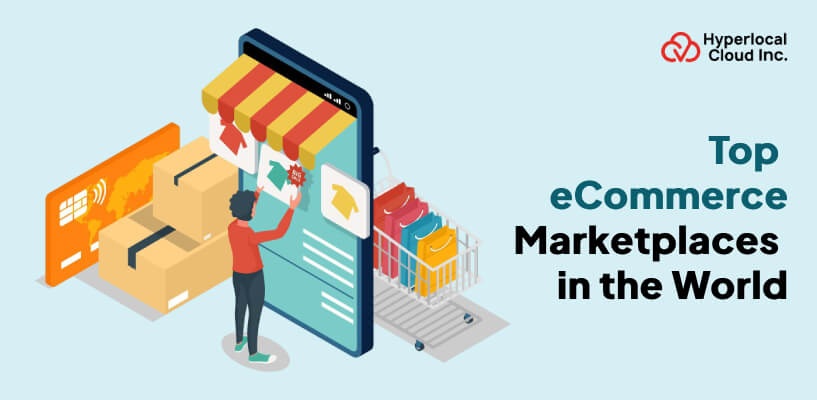Top eCommerce Marketplaces in the World in 2025

When it comes to an e-commerce marketplace, it is a platform where sellers sell their products or services globally. However, it collects several suppliers on the same platform to facilitate market users. Usually, an e-commerce market for companies focuses on sales and inventory management.
In addition, the e-commerce market is aimed at a wide range of viewers or business models that further enhance their business growth with a specific e-commerce platform. However, the growth of the eCommerce marketplace is projected to reach around $4.32 trillion in 2025, and is expected to reach around $5.89 trillion by 2029.
In this blog, you will get to know about the top eCommerce platforms in 2025 that facilitate users. However, businesses looking to start their journey can develop an app similar to the ones mentioned in the blog.
What is an eCommerce Marketplace?
An eCommerce marketplace is typically a centralized digital platform that allows sellers to sell their products to buyers. However, buyers are allowed to browse and purchase the products according to their needs. It serves as a central hub for multiple vendors, enabling users to access various products from different vendors on a single platform. Some of the most notable examples of online e-commerce marketplaces include Amazon, eBay, Flipkart, Myntra, Alibaba, Etsy, and Walmart.
Turn Your eCommerce Idea Into Reality
The Types of eCommerce Marketplaces
Take a look at the different e-commerce marketplaces in 2025.
1. B2B Marketplace
A B2B marketplace typically facilitates transactions between businesses to help companies obtain essential goods, including raw materials, wholesale products, or specialized services. The example of a B2B e-commerce marketplace is IndiaMART.
2. B2C Marketplace
The main goal of the B2C Marketplace is to connect companies with individual consumers or users. This means that the product or service is sold directly to the person for personal use. An example of B2C e-commerce is Amazon.
3. P2P Marketplace
A P2P (peer-to-peer) e-commerce marketplace is often referred to as a decentralized marketplace. The P2P business model enables individuals to sell, buy, and rent services and products directly, without the need for third-party involvement. Apps like Airbnb and an app like Turo are prime examples in this marketplace.
4. Vertical Marketplace
The primary purpose of a vertical market is to target a specific audience within a niche or category, such as beauty, home decor, or fashion. This market specializes in the construction of a wide range of products in a particular industry. Nykaa or FirstCry is an example of this market.
5. Horizontal Marketplace
A horizontal market specifically aimed at a wide range of the audience with different niches and categories. However, it is also known as a multi-channel platform, which allows the customer to buy everything from the same platform. Examples of horizontal platforms include Flipkart.
6. Product-based Marketplace
In a product-based market, suppliers typically offer physical or digital products that facilitate the user, consumer, or buyer. This market typically operates under a centralized location, where suppliers have the exclusive right to offer their physical goods. Etsy is considered an example of a product-based market.
7. Service-based Marketplace
The service-based type typically involves businesses that want to sell their online services to buyers. For this type of marketplace, contractors, freelancers, or professionals are the best examples. Thus, it becomes easy for users to purchase online services using a secure transaction platform.
The Comprehensive Features of an Online eCommerce Marketplace
An online eCommerce marketplace comes with a wide range of benefits that simultaneously facilitate both users and sellers. A detailed list of the key features of an online eCommerce platform is precisely discussed below. Just have a look:
For Buyers:
1. User-Friendly Interface: An online eCommerce marketplace platform offers a clean, smooth, and user-friendly interface, providing a seamless experience for users.
2. Secure Payment Options: The platform offers payment gateway integration, allowing users to choose from multiple payment options, including debit/credit cards, UPI, digital wallets, and PayPal. This, however, will enhance the security of the transaction.
3. Easy Navigation: This feature enables users to filter, browse, and categorize specific items. This will make it easy for users to buy the particular item.
4. Detailed Product Pages: This feature is helpful to add a high-quality image of a product. Additionally, with this feature, users can review the product description and feedback from other users.
5. Mobile-Friendly: The online eCommerce marketplace is a mobile-friendly platform that runs smoothly without any glitches. This will provide a seamless shopping experience for users.
6. Order Tracking: With this feature, users can easily track their order and receive advance notice of the delivery.
7. Customer Reviews: This feature allows users to rate their overall experience with an online eCommerce marketplace. However, these reviews help other users to make a better decision while purchasing a product or service.
8. Customer Support: The customer support feature enables users to connect with sellers to resolve their specific queries.
9. Returns and Refunds: With this feature, users are enabled to return the product within a specific time frame and receive a refund at the same time.
For Sellers:
1. Seller Onboarding: This will enable sellers to easily join the online eCommerce marketplace by listing their specific products or services.
2. Seller Dashboard: Sellers have access to a dashboard that provides them with tools for managing inventory, orders, and overall sales data.
3. Product Listings: Sellers utilize various templates, high-quality images, and detailed descriptions of the products or services they wish to list on the platform.
4. Inventory Management: This feature provides a system for tracking and monitoring inventory levels to effectively manage stock.
5. Shipping Integration: This feature enables sellers to integrate with various shipping providers, streamlining the overall shipping process.
6. Payment Processing: This feature ensures a secure, reliable, transparent, and efficient payment processing for sellers.
7. Customer Relationship Management (CRM): This feature enables the sellers to manage customer interactions and interests. This, however, will build a significant connection between a user and a seller.
Need Help Choosing a Marketplace Business Model
The Top eCommerce Marketplaces in the World in 2025
The multi-vendor marketplace app represents the diverse and dynamic landscape of online retail in 2025. From global giants to regional leaders, each platform offers unique features and services that cater to the evolving needs of both consumers and businesses. Have a look at the following:
1. Amazon
Amazon dominates the global e-commerce landscape and offers a diverse range of products across various categories. With its comprehensive logistics network and customer-focused approach, Amazon remains a two-way platform for online stores worldwide. However, businesses can also develop their own Amazon clone app and reshape the eCommerce marketplace with a strong user base.
2. Alibaba
As a large Chinese e-commerce platform, Alibaba connects buyers and sellers globally, facilitating B2B transactions. The extensive product range and robust supply chain make it a significant player in the global market. However, to boost sales, save time, and increase brand awareness, startups or businesses build an app like Alibaba. To know how much it costs to develop an app like Alibaba, it is suggested to connect with an experienced mobile app development company.
3. Pinduoduo
Pinduoduo has revolutionized online shopping in China by integrating social networks with e-commerce. Thus, this model encourages users to share agreements with friends, mass growth, and user connection. However, this is a proficient platform for multiple vendors to sell their products.
4. Meituan
Meituan is a Chinese platform that offers many types of services, including food delivery, hotel booking, and movie tickets. The e-commerce segment focuses on local services that cater to the diverse needs of urban consumers. Thus, this platform offers various services on a single platform.
5. MercadoLibre
MercadoLibre is the largest e-commerce platform in Latin America, offering a market for buying and selling products across various categories. The integrated payment system, MercadoLibre, improves the shopping experience for users in the region.
6. Sea (Shopee)
Shopee has become a vital e-commerce platform in Southeast Asia and Latin America under the Sea Group umbrella. The mobile-first approach and localized strategies have been consistently applied to consumers in these areas. However, it’s a localized marketplace or a comprehensive eCommerce ecosystem in order to support the sellers.
7. JD.com
JD.com, also known as Jingdong Mall, is a major Chinese e-commerce company that offers a wide range of products, including electronics, clothing, and groceries. Its commitment to rapid distribution and quality assurance has served it a loyal customer base.
8. Copart
Copart is an expert in online auctions, including the disposal and re-purposing of cars. The platform connects buyers and suppliers and offers a large inventory and competing dialect options. This platform collects the payment from both the seller and the user for every single order.
9. Coupang
Coupang is a South Korean e-commerce veteran known for its rapid distribution services and extensive product choices. The “rocket delivery” system ensures that customers receive their orders immediately, often within hours. This platform is very popular among users and has access to a large customer base.
10. Walmart Marketplace
Walmart Marketplace allows third-party suppliers to list their products on Walmart’s website and expand the dealer’s product offerings. With its vast customer base and established brand, Walmart provides significant exposure to suppliers. Businesses learn how to build a marketplace like Walmart and then launch their own. This approach enhances the business and turns it into a profitable platform.
11. eBay
eBay remains a significant online marketplace, offering both auction and fixed-price listings for a diverse range of products. Global access and different product categories make it a popular choice for both buyers and sellers. This platform is a great alternative for individuals looking for a startup.
12. Rakuten
Rakuten is a Japanese e-commerce platform that offers a marketplace for various products, including electronics, fashion, and groceries. Its loyalty program and customer satisfaction have contributed to the success of the Japanese market.
13. Etsy
Etsy is a global market that focuses on handmade, vintage, and unique objects. It provides craftsmen with a platform to showcase their products to global target groups, promoting a community of creators and buyers.
14. Temu
Temu, a subsidiary of PDD Holdings (Pinduoduo’s original company), has quickly expanded its presence in the US and other international markets. Temu is known for its competitive prices and diverse product offerings and has become a significant player in global ecommerce. The market reach of the Temu app is rapidly expanding and has gained popularity among users. Due to this, to establish a competitive approach in the eCommerce marketplace, businesses develop a Temu clone and offer numerous benefits to users.
15. Namshi
Namshi is one of the proficient ecommerce marketplaces that typically focuses on online fashion. With this platform, users can access products such as clothing, accessories, footwear, and beauty, which completely revolutionize their lifestyles. Additionally, it would be a great initiative if startups or entrepreneurs built their eCommerce marketplace with a Namshi clone.
Ready to Launch Your eCommerce Platform?
Conclusion
The concept of an ecommerce marketplace is rapidly growing, presenting an excellent opportunity for a wide range of vendors to sell their products and generate a substantial profit. The top ecommerce marketplace mentioned above targets different niches or categories and facilitates users accordingly. However, there is also a chance for the startups to create and launch an online eCommerce marketplace with the help of an experienced firm that develops marketplace software.





